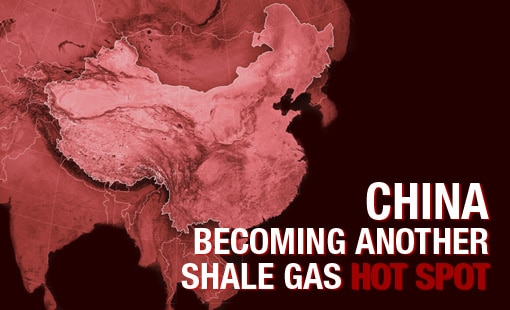To satisfy its thirst for energy, China is very quickly becoming a big player in the shale gas industry. Unfortunately, whether at home or abroad, there also seems to be little concern from Chinese leadership for the destructive environmental impact of drilling for heavily polluting shale gas – which is often drilled for using the controversial hydraulic fracturing (a.k.a. fracking) method.
Domestically: Investing in shale gas in China
China’s National Energy Administration is quickly working to draft a plan to develop the country’s shale gas reserves, which are estimated at more than 10 times its conventional gas reserves.
Early in 2010, China’s Ministry of Land and Resources (MLR) set a target for the country to identify 50-80 shale gas areas and 20-30 exploration and development blocks by 2020. Moreover, the MLR’s Strategic Research Centre for Oil and Gas wants to produce 8-12% of China’s gas from shale wells by 2020.
State-controlled PetroChina (a.k.a. China National Petroleum Corporation) announced its intention to produce 500 million cubic meters of shale gas by 2015 and Sinopec Corporation also wants to exploit some 2.5 billion cubic meters of shale gas and coalbed methane in that time. Already, Royal Dutch Shell is drilling 17 gas wells, for both tight gas and shale gas, and plans to spend $1 billion a year over the next five years on shale gas in China.
Internationally: Investing in shale gas across the Pacific
China is rushing to become an important player in securing international gas exports, particularly in Canada’s westernmost province, British Columbia (BC). China has found an eager partner in BC which supports a booming shale gas industry with its lax oversight of shale operations, its public servants who are opposed to receiving outside advice and as of several weeks ago a new provincial leader who takes her advice from a shale gas baron who is a former EnCana Corporation CEO. Let us not forget that this gas will also sell in Asia for as much as three times its price in Canada.
Michael McCullough writes that the state-controlled China Daily reported that Chinese producers are scouring the globe for gas reserves “to reduce reliance on coal and satisfy [China’s] energy hunger to fuel its economy…”
In February, PetroChina invested some $5.4 billion into EnCana’s Cutbank Ridge project, which was the largest investment by a Chinese state–controlled firm in Canada. EnCana CEO Randy Eresman said: “In the longer term, they have expressed a desire to be involved in the North American LNG market…”
Only a couple of weeks ago, partners in the proposed Kitimat LNG facility at Bish Cove on BC’s north coast awarded the engineering and design contract to take gas from pipelines and turn it into a liquid for marine transport to notorious former Halliburton subsidiary KBR.
The President of Kitimat LNG, Janine McArdle, described this announcement’s importance for Asia, saying: “This is another important milestone for Kitimat LNG, taking us a significant step closer in being able to export LNG to Asia-Pacific markets as soon as 2015.”
Now, a second LNG export facility north of the one at Bish is being proposed.
The Pacific Institute for Climate Solutions (PICS) has twice advised the BC government that shale gas drilling is incompatible with legislated carbon emission reductions. These concerns, however, continue to fall on deaf ears as the promises of fossil fuel company’s investments are taking precedence. China’s shale expansion only aggravates the difficulty of protecting the natural environment from fossil fuel expansion.
Where to from here?
The scale of development and the rapid growth of this polluting fossil fuel risk many of China’s climate change action goals and its claims on environmentally friendly development. The U.S. Environmental Protection Agency (EPA) has found that huge amounts of global warming pollution are produced in the extraction of shale gas, on par with coal emissions. The EPA is also conducting an extensive study of fracking. The preliminary findings from this investigation are expected at the end of 2012, with final results in 2014. Recently, the New York Times has also drawn much attention to the dangers that fracking poses to human health and freshwater, through its series Drilling Down.
At home in China, decisionmakers would do well to examine the contamination threats and other problems experienced by their North American counterparts before rushing to exploit shale gas. The health and environmental risks from shale gas development and fracking have led New Jersey to ban fracking outright, and Maryland’s House has passed a full shale gas moratorium until 2013. In Canada, the province of Québec has banned fracking for at least two years.
Environmental advocates should be wary about China moving into BC and elsewhere to secure and invest in shale gas projects. While in the short term the economy may benefit from foreign investment, in the long run, more pipelines will mean greater dependence on fossil fuels. Turning a blind eye to their destructive influence on the climate would leave China in the same troubling position that Canada and the U.S. now find themselves in, with no adequate clean energy policy and no effective response to climate change.
Shale gas is hardly an energy “solution” – in fact it creates a host of climate-altering and water-threatening risks – so China should reexamine the wisdom of pursuing this dirty fuel.
Subscribe to our newsletter
Stay up to date with DeSmog news and alerts






